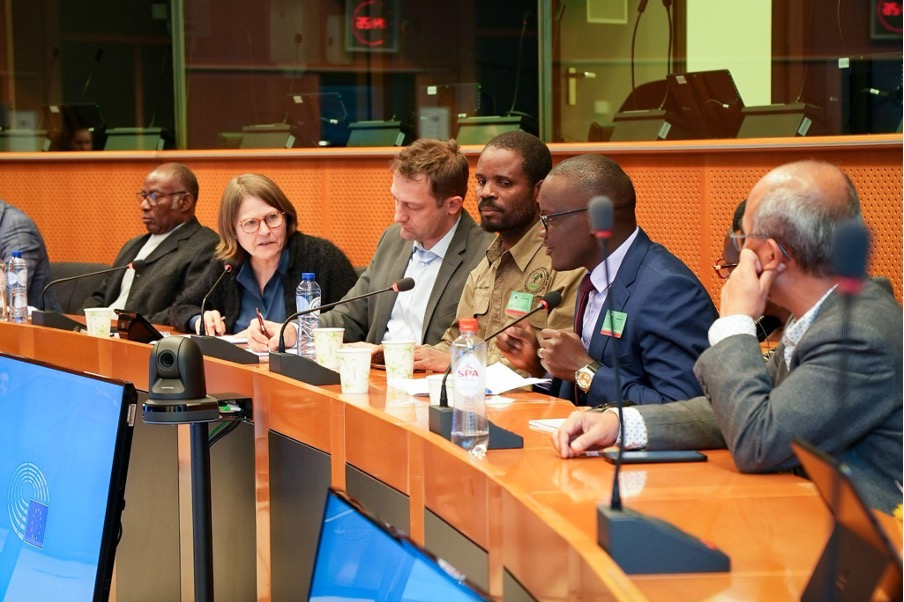Left to right: Daniel Amponsah, Heidi Hautala, Christophe Hansen, Pedro Marenja, Pison Kukundakwe, Kpomin Edi and Napolean Ningkos in conversation at the European Parliament. Photo credit: Steven De Winter/Solidaridad
A living income is a human right
The farmers were invited by MEPs Heidi Hautala (Greens/European Free Alliance) and Christophe Hansen (European People’s Party) and four civil society organisations: the Fair Trade Advocacy Office, Fairtrade International, the Rainforest Alliance and Solidaridad. In response to farmers’ realities, the organisations set out five recommendations for Brussels:
- Make sure companies enable living incomes for farmers in their value chains, through fairer prices and more stable buying commitments. This is a prerequisite for protecting the well-being of people, nature, and the climate;
- Ensure companies collaborate with all the farmers in their supply chains in an ongoing effort to improve sustainability performance. Trade relations should only be broken as a last resort;
- Ensure companies critically evaluate their own purchasing practices when addressing sustainability risks in their value chains;
- Foster meaningful dialogue with farmers and workers about the European laws affecting them, involving them in decision-making and implementation;
- Build relationships with countries producing for the European market, and ensure that farmers in those countries are supported to meet European standards for sustainable production.
What farmers said in the European Parliament
Kpomin Edi, President of the women’s cooperative of cocoa farmers in Adzopé Côte d’Ivoire, reminded the audience in the European Parliament that “unfair trading by cocoa companies, for example when they do not fulfill the contracts, is one of the reasons why farmers do not have a living income. The EU must act against this.”
Pedro Marenja of the cotton farmers’ forum (FONPA) in Mozambique said: “250,000 farming families in my country depend directly on cotton for their income. On average, these families earn $125 a year from the yield of cotton. That is far below the subsistence level. Poverty leads to many distressing problems such as child marriages that mainly affect young girls as young as 14 years old. To help solve poverty, cotton prices need to go up and European cotton and textile companies can help.”
Pison Kukundakwe of the Ankole coffee farmers’ cooperative (ACPCU) in Uganda, sees low and unstable coffee prices as the main problem. The coffee market in Uganda is dominated by a few traders who set prices. Production costs have risen significantly and climate change is creating new pests that are expensive to control. “We welcome new legislation, but please ensure that the extra costs are not borne by farmers. Shared responsibility, investment and cooperation are crucial,” Kukundakwe said.
Daniel Amponsah, president of the Asunafo cocoa farmers’ cooperative in Ghana believes European legislators should involve farmers in legislation that affects them. He stresses the importance of more cooperation in the value chain and calls for more programmes to combat deforestation. “If there is child labour, farmers are blamed. If there is forced labour, the farmers did it. Deforestation, it’s the farmers. Farmers are the foundation of the chocolate industry. If we don’t get fair prices, the whole industry collapses.”
Napolean Ningkos of the Sarawak Dayak palm oil farmers association (DOPPA) in Malaysia, is outspoken about the fact that palm oil is the Dayak’s only chance for sustainable economic development. But he also notes that Europe’s new rules risk excluding small farmers from the market. He wants more frequent meetings with Europe to work together on solutions for sustainable economic development for the Dayak in Sarawak in Borneo.
Reactions from MEPs, business and civil society
“Smallholders produce a third of the world’s food supply, but they remain some of the most marginalised actors in global value chains,” says Heidi Hautala MEP. “The proposed CSDDD is an opportunity to tackle this issue and contribute to decent livelihoods for smallholders. It must in particular ensure that companies take their responsibility to assess and address the impacts of their purchasing practices, including the price they pay to producers, to improve the incomes of smallholders.”
Christophe Hansen MEP, said he did not want to exclude anyone in international chains. He does not want to compromise on this principle in negotiations with the European Council and Commission on the new regulation. Hansen also said that smallholder farmers should receive adequate support and that good cooperation should facilitate enforcement of the rules.
Virginie Mahin of Mondelēz, a chocolate multinational, stressed that “a living income is a fundamental right. It is a core issue.” She also expressed support for sustainable prices on behalf of Mondelēz.
Boukje Theeuwes of Solidaridad stressed the importance of Europe provoking long-term investments by companies in sustainable value chains through regulation. She warned of the danger of problems actually getting worse if companies break trade relationships without solving the problems together.
Antonie Fountain, director of Voice Network, also author of the Cocoa Barometer, pointed out that “Europe cannot impose sustainability without paying fair prices. This legislation must address the root cause of poverty. If not, poor producers will be excluded from the European market.”
Watch the full presentation at the European Parliament Working Group on Responsible Business Conduct website.

